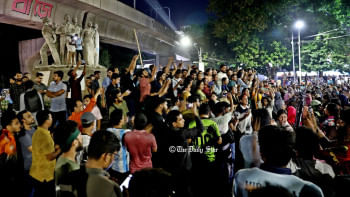Expanding Ansar's powers just before election is troubling

The proposed move to expand powers of the Ansar battalion has rightly raised concerns, coming as it does less than three months before a scheduled general election. The proposal was included in the recently introduced Ansar Battalion Bill-2023 in what would be the last session of the 11th parliament. As we know from past experience, the last sessions of a parliament are usually reserved for controversial, scarcely debated bills and provisions – one such law in 2018 was a certain Digital Security Act. As if to keep up with tradition, the government has done it again. Defending the move – which would enable Ansar members to arrest offenders, frisk detainees, and seize goods – the home minister thinks it is necessary to bolster law enforcement efforts during elections.
However, we are not convinced that this is a good enough reason. Despite claims to the contrary, the bill, as currently drafted, seems to grant Ansar the authority to perform tasks identical to those of the police. Ansar turning into a force parallel to the police, rather than being an auxiliary force meant to assist law enforcement agencies, has implications that extend beyond any election period. Overlapping roles and potential conflicts between the two forces – top police officials have already opposed the move – will likely deteriorate security rather than improve it. The fact is, we don't need more of the same police. We need them to be more accountable. If the latest move means having more uniformed men abusing their power to extort, harass or torture – just like errant, politically biased cops – then we are better off without them.
Ansar's cooperative efforts in disaster relief and crisis situations are well-recognised. But arming them with the power to intervene in public life or conduct investigations like the police can cause chaos in the whole law enforcement system. Who will ensure transparency and accountability in the exercise of their newfound powers? Having clearly defined roles and safeguards against abuse of authority is essential to the function of a security entity. Ansar's empowerment is particularly concerning given its potential impact on the approaching election. It raises questions about whether the government intends to use them to handle the increasingly intense opposition movement for its resignation, or for other oppressive purposes.
The possibility of abuse cannot be ruled out, considering the controversial role played by police during past elections. As the proposed bill now undergoes scrutiny by the parliamentary standing committee on home ministry, which has been asked to submit its report to parliament within three working days, we urge the committee to consider all possible implications of the law. The authorities should address the legitimate concerns of various stakeholders, including police and opposition lawmakers, and refrain from indulging those provisions in the Ansar bill.

 For all latest news, follow The Daily Star's Google News channel.
For all latest news, follow The Daily Star's Google News channel. 









Comments